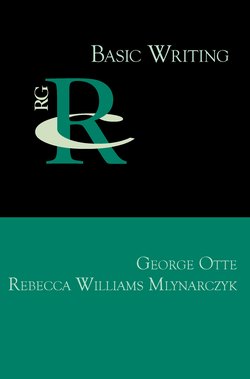Читать книгу Basic Writing - George Otte - Страница 7
На сайте Литреса книга снята с продажи.
ОглавлениеSeries Editor’s Preface
Charles Bazerman
I have a very personal connection with this volume. I began teaching at Baruch College of City University of New York when the second cohort of open admissions students had arrived. My position was defined specifically to meet the needs of these students new to the university, poorly prepared to meet traditional entrance standards. Three years before I met the younger siblings of these students as I taught elementary school in the Bedford-Stuyvesant section of Brooklyn. I was to spend the next twenty years of my career devoted to the task of making university education accessible to open admissions students by developing the writing skills necessary for success. I worked with colleagues across the City University of New York (CUNY), including Mina Shaughnessy, Ken Bruffee, Bob Lyons, Dick Larson, Harvey Wiener, Sondra Perl, Richard Sterling, Blanche Skurnick, Lynn Troyka, Karen Greenberg, and many others. We shared ideas for teaching, formed research projects, and fought institutional battles to keep alive the spirit of open admissions and the mission of CUNY to provide opportunity for all of New York’s diverse students.
I knew that mission because almost forty years before I began teaching, my immigrant father had begun studies in City College, Downtown Branch, in the very same building where I was to work. When I was a child, he took me to see the building and his graduation honors inscribed on an honor roll at the entrance. On our home bookshelves were the books my father had used for his freshman composition class years before.
At the very same spot as Baruch College and its prior incarnation as Downtown City, in 1847 the Free Academy of the City of New York was founded by President of the Board of Education Townsend Harris. This first institution for public higher education would provide access to free higher education for generations of immigrants and working class youth based on academic merit alone. The basic writing mission at CUNY formed the very grounds of my American and academic experience.
The project of basic writing addresses a fundamental question of equity and opportunity: What are we to do, as a society, with the fact that large parts of our population reach the age for higher education with only limited writing skills, inadequate for the challenges of the university or the contemporary workplace? This situation may be blamed on many things: failed policies, failed school systems, misguided pedagogies, class, race, family, perceived job prospects, dialect and language, culture and technology, individual motivation and discipline, social anomie, developmental trauma and difficulties, or whatever other ills might be identified in society, economy, or individuals. Whatever cluster of causes may come together in each individual case, they all fit within a larger picture of our society becoming more literate, requiring larger numbers of highly literate citizens and workers, raising the literate demands on even the most prepared, and providing attractive opportunities only to those who are prepared to communicate effectively in writing with knowledge gained from reading. For a century and a half higher education has been opening its doors ever wider to provide opportunities and produce the intelligence needed for prosperity, governance, and social harmony. That educational project has meant that colleges and universities have been drawing and will continue to draw in students at the margins of preparation. It is a matter of equity and societal self-interest to provide these students the tools to succeed along with their better prepared colleagues.
Basic writing as an educational imperative sits at the frontier of expanding university opportunity. While the Free Academy may have been founded on the corner of 23rd Street and Lexington Avenue in New York City, its vision of access and mobility has spread not only through New York and the United States but also throughout the globe. As access to higher education has been expanding in every nation, the educational systems have been struggling with how to meet the literacy needs of new populations entering the university. Writing education is on the global increase, much of it directed toward what we would consider basic writing. As I finish this preface, I am at a campus in rural Brazil consulting with faculty dealing with these same issues; they seek the same access and social change we sought in New York but with even more limited resources and greater constraints. This book provides many lessons of value to every region as they engage pedagogy, policies, and institutional politics to meet the needs of students and provide real opportunity. The mission of basic writing seems to be always in a state of struggle, but because it is at the edge of social change and growth, and that may be the greatest lesson, we have no choice but to persist in this struggle.
